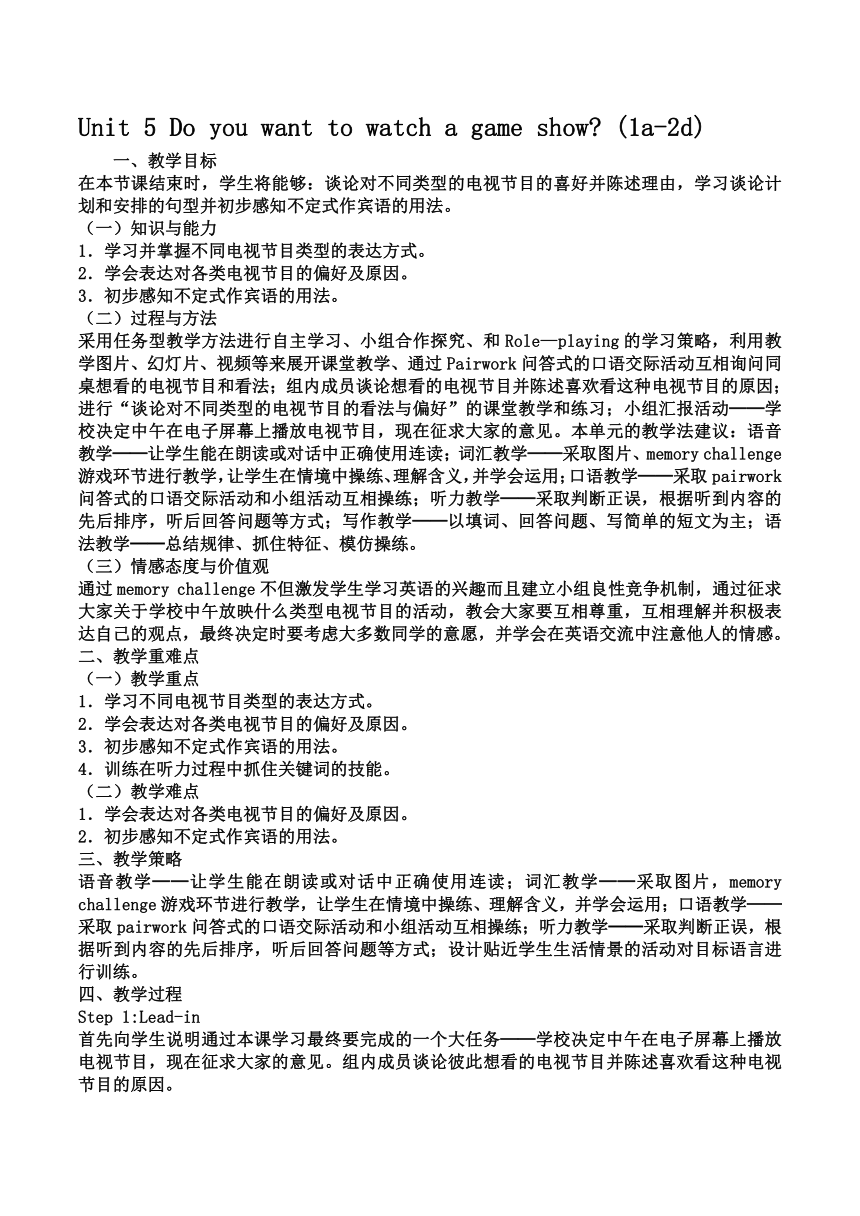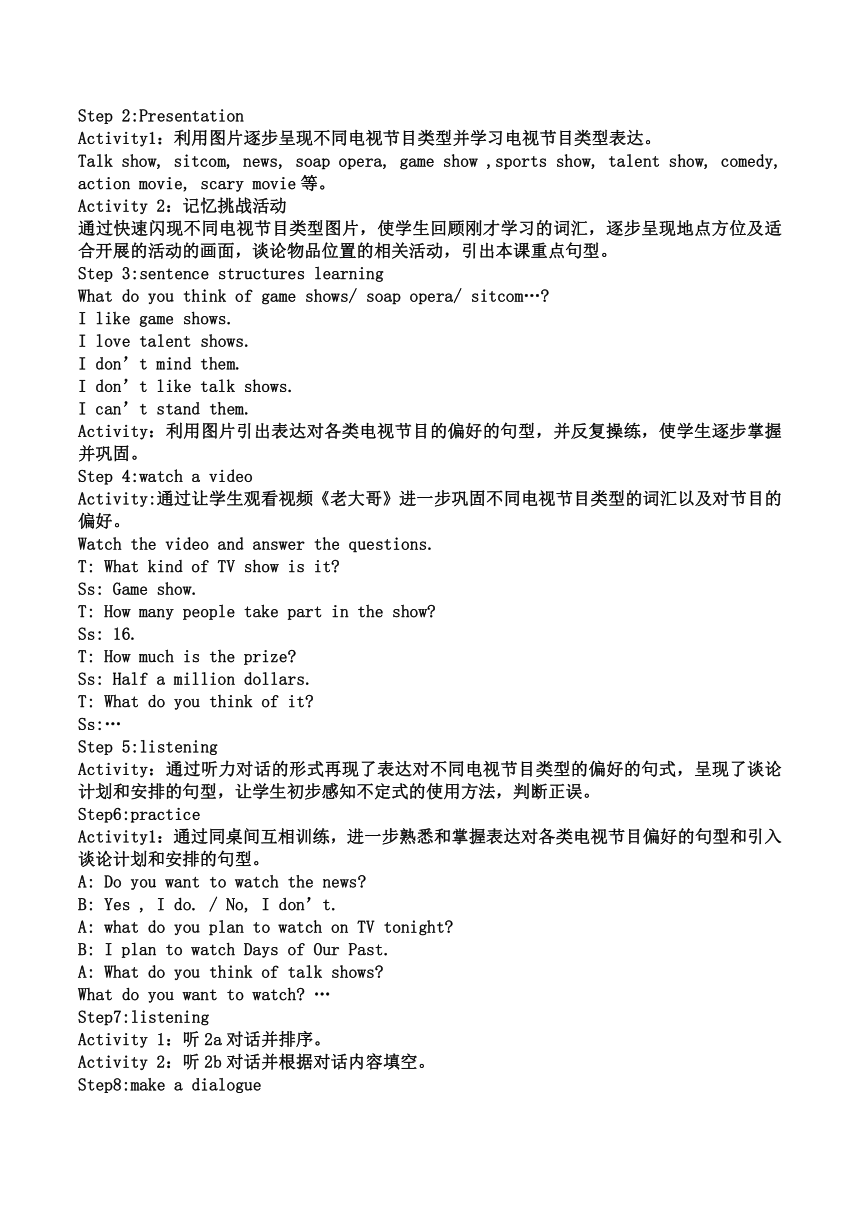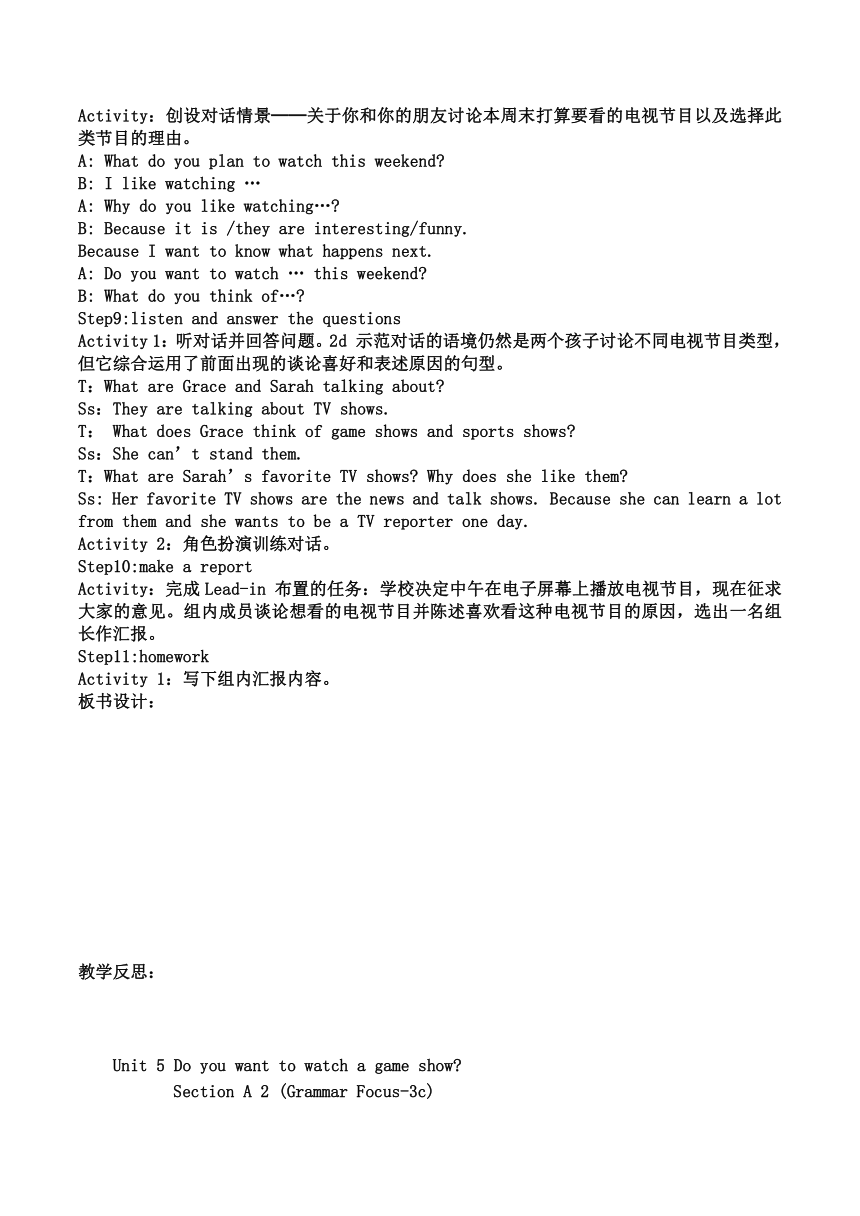八年级英语上册Unit 5 Do you want to watch a game show?教案
文档属性
| 名称 | 八年级英语上册Unit 5 Do you want to watch a game show?教案 |

|
|
| 格式 | zip | ||
| 文件大小 | 74.5KB | ||
| 资源类型 | 教案 | ||
| 版本资源 | 人教新目标(Go for it)版 | ||
| 科目 | 英语 | ||
| 更新时间 | 2017-06-21 00:00:00 | ||
图片预览





文档简介
Unit
5
Do
you
want
to
watch
a
game
show
(1a-2d)
一、教学目标
在本节课结束时,学生将能够:谈论对不同类型的电视节目的喜好并陈述理由,学习谈论计划和安排的句型并初步感知不定式作宾语的用法。
(一)知识与能力
1.学习并掌握不同电视节目类型的表达方式。
2.学会表达对各类电视节目的偏好及原因。
3.初步感知不定式作宾语的用法。
(二)过程与方法
采用任务型教学方法进行自主学习、小组合作探究、和Role—playing的学习策略,利用教学图片、幻灯片、视频等来展开课堂教学、通过Pairwork问答式的口语交际活动互相询问同桌想看的电视节目和看法;组内成员谈论想看的电视节目并陈述喜欢看这种电视节目的原因;进行“谈论对不同类型的电视节目的看法与偏好”的课堂教学和练习;小组汇报活动──学校决定中午在电子屏幕上播放电视节目,现在征求大家的意见。本单元的教学法建议:语音教学──让学生能在朗读或对话中正确使用连读;词汇教学──采取图片、memory
challenge游戏环节进行教学,让学生在情境中操练、理解含义,并学会运用;口语教学──采取pairwork问答式的口语交际活动和小组活动互相操练;听力教学──采取判断正误,根据听到内容的先后排序,听后回答问题等方式;写作教学──以填词、回答问题、写简单的短文为主;语法教学──总结规律、抓住特征、模仿操练。
(三)情感态度与价值观
通过memory
challenge不但激发学生学习英语的兴趣而且建立小组良性竞争机制,通过征求大家关于学校中午放映什么类型电视节目的活动,教会大家要互相尊重,互相理解并积极表达自己的观点,最终决定时要考虑大多数同学的意愿,并学会在英语交流中注意他人的情感。
二、教学重难点
(一)教学重点
1.学习不同电视节目类型的表达方式。
2.学会表达对各类电视节目的偏好及原因。
3.初步感知不定式作宾语的用法。
4.训练在听力过程中抓住关键词的技能。
(二)教学难点
1.学会表达对各类电视节目的偏好及原因。
2.初步感知不定式作宾语的用法。
三、教学策略
语音教学──让学生能在朗读或对话中正确使用连读;词汇教学──采取图片,memory
challenge游戏环节进行教学,让学生在情境中操练、理解含义,并学会运用;口语教学──采取pairwork问答式的口语交际活动和小组活动互相操练;听力教学──采取判断正误,根据听到内容的先后排序,听后回答问题等方式;设计贴近学生生活情景的活动对目标语言进行训练。
四、教学过程
Step
1:Lead-in
首先向学生说明通过本课学习最终要完成的一个大任务──学校决定中午在电子屏幕上播放电视节目,现在征求大家的意见。组内成员谈论彼此想看的电视节目并陈述喜欢看这种电视节目的原因。
Step
2:Presentation
Activity1:利用图片逐步呈现不同电视节目类型并学习电视节目类型表达。
Talk
show,
sitcom,
news,
soap
opera,
game
show
,sports
show,
talent
show,
comedy,
action
movie,
scary
movie等。
Activity
2:记忆挑战活动
通过快速闪现不同电视节目类型图片,使学生回顾刚才学习的词汇,逐步呈现地点方位及适合开展的活动的画面,谈论物品位置的相关活动,引出本课重点句型。
Step
3:sentence
structures
learning
What
do
you
think
of
game
shows/
soap
opera/
sitcom…
I
like
game
shows.
I
love
talent
shows.
I
don’t
mind
them.
I
don’t
like
talk
shows.
I
can’t
stand
them.
Activity:利用图片引出表达对各类电视节目的偏好的句型,并反复操练,使学生逐步掌握并巩固。
Step
4:watch
a
video
Activity:通过让学生观看视频《老大哥》进一步巩固不同电视节目类型的词汇以及对节目的偏好。
Watch
the
video
and
answer
the
questions.
T:
What
kind
of
TV
show
is
it
Ss:
Game
show.
T:
How
many
people
take
part
in
the
show
Ss:
16.
T:
How
much
is
the
prize
Ss:
Half
a
million
dollars.
T:
What
do
you
think
of
it
Ss:…
Step
5:listening
Activity:通过听力对话的形式再现了表达对不同电视节目类型的偏好的句式,呈现了谈论计划和安排的句型,让学生初步感知不定式的使用方法,判断正误。
Step6:practice
Activity1:通过同桌间互相训练,进一步熟悉和掌握表达对各类电视节目偏好的句型和引入谈论计划和安排的句型。
A:
Do
you
want
to
watch
the
news
B:
Yes
,
I
do.
/
No,
I
don’t.
A:
what
do
you
plan
to
watch
on
TV
tonight
B:
I
plan
to
watch
Days
of
Our
Past.
A:
What
do
you
think
of
talk
shows
What
do
you
want
to
watch
…
Step7:listening
Activity
1:听2a对话并排序。
Activity
2:听2b对话并根据对话内容填空。
Step8:make
a
dialogue
Activity:创设对话情景──关于你和你的朋友讨论本周末打算要看的电视节目以及选择此类节目的理由。
A:
What
do
you
plan
to
watch
this
weekend
B:
I
like
watching
…
A:
Why
do
you
like
watching…
B:
Because
it
is
/they
are
interesting/funny.
Because
I
want
to
know
what
happens
next.
A:
Do
you
want
to
watch
…
this
weekend
B:
What
do
you
think
of…
Step9:listen
and
answer
the
questions
Activity
1:听对话并回答问题。2d
示范对话的语境仍然是两个孩子讨论不同电视节目类型,但它综合运用了前面出现的谈论喜好和表述原因的句型。
T:What
are
Grace
and
Sarah
talking
about
Ss:They
are
talking
about
TV
shows.
T:
What
does
Grace
think
of
game
shows
and
sports
shows
Ss:She
can’t
stand
them.
T:What
are
Sarah’s
favorite
TV
shows
Why
does
she
like
them
Ss:
Her
favorite
TV
shows
are
the
news
and
talk
shows.
Because
she
can
learn
a
lot
from
them
and
she
wants
to
be
a
TV
reporter
one
day.
Activity
2:角色扮演训练对话。
Step10:make
a
report
Activity:完成Lead-in
布置的任务:学校决定中午在电子屏幕上播放电视节目,现在征求大家的意见。组内成员谈论想看的电视节目并陈述喜欢看这种电视节目的原因,选出一名组长作汇报。
Step11:homework
Activity
1:写下组内汇报内容。
板书设计:
教学反思:
Unit
5
Do
you
want
to
watch
a
game
show
Section
A
2
(Grammar
Focus-3c)
一、教学目标:
1.
语言知识目标:
1)
学习掌握下列词汇:joke,
comedy
2)进行一步复习巩固运用Section
A
部分所学的生词和词组。
3)进一步学习运用所学的知识来陈述自己的看法;学会谈论自己的喜好。
4)
掌握动词不定式结构做动词的宾语这一语法知识;掌握后面接动词不定式做宾语的动词。
2.
情感态度价值观目标:
学会谈论流行文化,了解各类电视和电视节目的名称和自己的喜欢。
注意引导学生们形成正确的文化观念,大力培养学生们的跨文化意义,形成自己独立的个性。
二、教学重难点
1.
教学重点:
1)
进一步学习运用所学的知识来陈述自己的看法;学会谈论自己的喜好。
2)
掌握动词不定式结构做动词的宾语这一语法知识;掌握后面接动词不定式做宾语的动词。
2.
教学难点:
掌握动词不定式结构做动词的宾语这一语法知识;掌握后面接动词不定式做宾语的动词。
三、教学过程
Ⅰ.
Revision
1.
Have
a
dictation
of
the
new
words
learned
in
the
last
class.
2.
Ask
and
answer
questions
about
the
different
shows.
What
do
you
think
of
news
I
can’t
stand
it.
/
I
like
it.
/
I
don’t
mind
it.
I…
3.
Role-play
the
conversation
in
2d.
Ⅱ.
Grammar
focus
1.
学生阅读Grammar
Focus中的句子,然后做填空练习。
①
你想看新闻吗?
Do
you
want
to
____
______
_____
②
你觉得谈话节目怎么样?
What
do
you
______
___
_____
shows
③
我不介意看。/我不能忍受。/
我喜欢看。
I
don’t
______
them.
I
____
______
them.
I
____
________
them.
④
你计划今晚上看什么节目?
_______
do
you______
_____watch
tonight
⑤
我计划看《我们过去的时代》。
I
______
____
watch
Days
of
Our
Past.
⑥
你期望从情景喜剧中学到什么?
What
can
you
______
___
____
from
sitcoms
⑦
你能学到一些很好的笑话。
You
can
_______
some
great
_____.
⑧
你为什么喜欢看新闻呢?
Why
do
you
like
_________
___
______
⑨
因为我希望查明在世界各地发了什么事情?
Because
I
______
____
_____
___
what’s
going
________
the
world.
2.
学生们根据记忆,看大屏幕来完成填空练习。
3.
学生们完成填空试题后,可以打开课本检查答案,对错误的句子,单独进行强化记忆。
Ⅲ.
Grammar
动词不定式做宾语的用法:
动词不定式的形式:to
+
动词原形
Jack
wants
to
buy
some
flowers
for
Mr.
Wu.
杰克想给吴老师买些花。
常见的跟动词不定式做宾语的动词:
想要
期望
希望计划决定开始开始
2.
最后,由各小组长来说一说他们小组所做的总结。
3.
大屏幕出示常见的跟动词不定式做宾语的动词和同学们一起对答案。
二、【拓展】省略to
的不定式有些动词后面跟动词不定式时应将不定式符号to省去。常见的动词有let,
make,
feel,
help,
watch,
hear等。例句:
让我来帮助你。
Let
me
help
you.
你能帮助我打扫房间吗?
Can
you
help
me
clean
the
house
Ⅳ.
及时练
用所给单词的适当形式填空:
1.
She
expects
_________
(arrive)
tomorrow.
2.
Let’s
_______
(watch)
talk
shows
tonight.
3.
They
hope
_________
(visit)
the
Great
Wall
next
year.
4.
Do
you
plan
_______
(find)
a
part-time
job
5.
When
do
you
want
_____
(go)
swimming
6.
My
uncle
often
helps
me
________
(learn)
math
and
English.
Ⅴ.
New
words
joke,
comedy
Ⅵ.
Practice
Work
on
3a:
1.
Tell
Ss
to
read
the
conversation
in
3a
and
try
to
fill
in
the
blanks
with
right
words.
2.
方法指导:应通读整个对话,掌握对话大意;
然后,根据问句所问的内容及自己的实际情况来回答问题。
注意,第二个问是一个选择疑问句,意为“你想看……还是看……呢?”
3.
学生们,按老师指导的方法进行阅读,并逐句推敲每空应填什么词语,在实际的运用提高自己的阅读能力、分析能力及综合运用能力。
4.
最后,教师与同学们一起校对答案,并对学生们有疑问的地方进行解释。
5.
学生们两结对操练对话,最后找几名学生来表演一下对话。
Work
on
3b:
1.
让学生们阅读表格中的问题,明白每个问题的意思。
2.
让学生们思考一下他们自己的实际情况,并做出正确的回答。
3.
让学生们互相检查自己所写的句子,发现并改正错误。
4.
让部分学生就这些问题进行问答,说出自己所写的句子。大家一起改正句子中的错误。
Word
on
3c:
1.
让一名学生读表格中的内容。并告诉学生们本学习活动的要求。
2.
先由一名学生们对自己的小组成员进行提问,询问每一名成员希望看的内容。然后,在表格中的适当位置记下他们的名字。
3.
由其余的同生们根据表格中的情况来写一个小组成员情况的报告。大家互相讨论一下这些报告,最后,确定出一个最完整且没有错误的报告。
4.
由这名学生来向同学生汇报自己小级的情况。
(最后,可以经学生们评议来推举最有能力的小组)
VII.
Exercises
VIII.
Writing
task
写一个报告,陈述一下你的爸爸、妈妈及祖父母亲分别喜欢看什么类型
节目,并简要说明原因。
My
mother
likes
sitcom.
She
thinks
they’re
interesting.
…
板书设计
教学反思:
Unit
5
Do
you
want
to
watch
a
game
show
Section
B
1
1a-2e
一、教学目标:
1.
语言知识目标:
1)
能掌握以下单词:meaningless,
action,
action
movie,
cartoon,
culture,
famous,
appear,
become,
rich,
successful,
might,
main,
reason,
film,
unlucky,
lose,
ready,
be
ready
to,
character,
guy
2)
能掌握以下句型:
①
I
like
to
watch
action
movies
because
they’re
exciting.
②
John
wants
to
watch
talk
shows
because
they’re
enjoyable.
③
One
of
the
main
reasons
is
that
Mickey
was
like
a
common
man.
④
However,
he
was
always
ready
to
try
his
best.
⑤
People
today
expect
to
see
more
than
just
a
little
mouse
fighting
bad
guys.
2.
情感态度价值观目标:
了解他人对不同的电影或电视剧的看法,明白不同的人有不同的喜好,从而明确人们喜好的差异性;了解世界其他国家的文化,形成跨文化的意思。
二、教学重难点
1.
教学重点:
1)
掌握本课时出现的生词及表达方式。
2)
进行听力训练,提高综合听说能力。
3)阅读短文,获得相关信息,提高学生们的综合阅读能力。
2.
教学难点
1.
听力训练
2.
阅读2b部分的短文并完成相关要求。
三、教学过程
Ⅰ.
Revision
看图画让学生们根据图片提示来完成句子,注意动词不定式的用法。
Ⅱ.
Lead-in
T:
Show
some
movies
or
shows
on
the
big
screen.
Let
Ss
discuss
about
them.
Ask
and
answer
what
they
think
of
them.
Ⅲ.
New
words
Present
some
new
words
on
the
big
screen.
Ⅳ.Work
on
1a
1.
Work
with
your
partners.
Ask
and
answer
about
the
movies
or
shows.
2.
Let
Ss
talk
about
the
movies
or
shows
with
the
words
in
1a.
3.
Let
some
pairs
ask
and
answer
in
front
of
the
class.
Ⅴ.
Listening
Work
on
1b:
1.
Tell
Ss
to
listen
and
circle
the
description
words
you
hear
in
the
box
in
1a.
2.
Play
the
recording
for
the
Ss.
Ss
just
listen
for
the
first
time.
Play
the
recording
again
and
circle
the
words.
3.
Play
the
recording
and
check
the
answers
with
the
Ss.
Work
on
1c:
1.
T:
Now
please
look
at
the
chart
in
1c.
What
do
John
and
Mary
think
of
the
movies
or
shows
You'll
listen
to
the
tape
again.
Then
try
to
fill
in
the
blanks.
听力指导:要抓别人对他们两个人的看法所说的词汇,也就是那些表示看法的形容词。因此在听的时候,应重点放在对剧目进行评价的形容词上。
2.
Ss
listen
to
the
recording
carefully
and
try
to
fill
in
the
blanks.
3.
Play
the
recording
again
and
check
the
answers
with
the
class.
Ⅵ.
Discussion
1.
Work
in
groups.
Look
at
the
questions
in
2a.
2.
Ask
one
student
the
questions
as
a
model.
3.
Tell
Ss
to
discuss
the
questions
in
the
group.
Ⅶ.
Reading
1.
Introduce
something
about
Disney.
2.
New
words.
3.
Work
on
2b.
T:
Do
you
like
to
watch
cartoons
Do
you
know
Mickey
Mouse
Today
we’ll
learn
a
passage
about
Mickey
Mouse.
Let
Ss
read
the
passage
quickly
and
complete
the
time
line
on
next
page.
Ss
read
the
passage
quickly
and
complete
the
time
line
on
next
page.
Check
the
answers
with
the
Ss.
4.
Work
on
2c.
First,
let’s
read
the
questions
in
the
chart.
Make
sure
all
the
students
know
the
meaning
of
the
questions.
Then
read
the
passage
again
and
find
the
answers
to
the
questions.
方法指导:首先,应读懂五个题目的意思;然后,带着这五个问题再次认真阅读短文的内容,并在短文中找出相关问题的回答依据。
综合短文内容与题目内容,确定最为贴切的答案。
Ss
read
carefully
and
try
to
find
the
answers
to
the
questions.
Check
the
answers
with
the
class.
5.
Work
on
2d
T:
Read
the
passage
again.
This
time
you
should
discuss
the
questions
with
a
partner.
方法指导:首先,在短文中找到相关问题的回答依据;然后,与伙伴来讨论一下这个问题,结合自己生活经历回答出这个问题;
Let
some
Ss
talk
about
their
answers.
VIII.
Explanation
IX.
Homework
1.
Finish
2e
on
P38.
2.
Remember
the
words
and
phrases
in
the
lesso
板书设计:
Section
B
2
(3a-Self
Check)
一、教学目标:
1.
语言知识目标:
1)
掌握下列生词:
dress
up;
take
sb.’s
place,
army,
do
a
good
job
2)
复习to不定式做宾语的用法。掌握后面跟不定式结构做宾语的动词。
3)
能够综合运用所掌握的知识来描述自己所喜欢的一些动画片或影视剧。
3)
通过自己所喜欢的一些动画片或影视剧来达到熟练运用所学知识的目的。
2.
情感态度价值观目标:
1)
每个人都有自己的爱好,要了解个体的差异性,了解自己的爱好,尊重别人的爱好。
2)了解一些影视片的内容,通过观看不同形式的影视片来了解社会,丰富自己的文化知识。
二、教学重难点
1.
教学重点:
1)
能运用所学的知识及提示来阅读相关影视片的简介,并能完成相关任务。
2)能运用所学的知识与句型表达方式来简介一下自己所看过的影视片。
2.
教学难点:
能运用所学的知识与句型表达方式来简介一下自己所看过的影视片。
三、教学过程
Ⅰ.
Revision
Review
the
main
phrases
learned
yesterday.
(1)
想起
__________
(2)
例如________
(3)
发行;出版
_________________
(4)
在二十世纪三十年代
______________
(5)
主要原因之一___________________
(6)
努力做某事
________________
(7)
愿意迅速做某事_______________
(8)
尽最大努力_____________
(9)
不仅仅;不只___________
Ⅱ.
Lead-in
Ask
some
questions
about
Mulan.
Let
the
Ss
think
and
answer
the
questions:
“Do
you
like
cartoons
Do
you
know
Mulan
Can
you
say
anything
about
it ”
Ss
discuss
the
questions
and
answer
the
questions.
e.g.
S1:
Yes,
I
do.
Mulan
didn’t
have
any
brothers.
She
took
his
father’s
place
to
fight
in
the
army.
S2:
Mulan
dressed
up
like
a
boy.
Nobody
knew
she
was
a
girl
in
the
army.
Ⅲ.
New
words
Ⅳ.
Reading
1.
Read
the
article
about
Mulan.
Fill
in
the
blanks
in
the
movie
review.
Use
the
words
in
the
box
to
help
you.
2.
写作指导:
本文为写自己所喜欢的电影的剧情回顾,
因此,时态应用一般现在时态与一般过去时态;
首先,可介绍影片的类型,及主人公等。
然后,介绍故事的梗概。
最后,表达你对该影片的总体看法。
3.
学生们根据写作提示,及上面表格中的提示来写作这篇文章。
4.
Let
some
Ss
read
their
passage
to
the
class.
Ⅵ.
Discussion
1.
Read
the
kinds
of
shows
or
movies
in
the
chart
in
4.
Ask
and
answer
about
them
with
a
partner.
Write
the
answers
in
the
chart.
2.
Give
Ss
some
examples:
S1:
What
do
you
think
of
soap
operas
S2:
I
think
they’re
boring.
What
about
you
S1:
Well,
I
don’t
like
them,
either.
3.
Ss
ask
and
answer
with
their
partners
and
try
to
fill
in
the
chart.
4.
At
last,
write
a
short
report
about
your
ideas
and
your
partner’s.
VII.
Self
check
Work
on
Self
check
1:
1.
Fill
in
the
blanks
with
the
superlative
forms
of
the
words
in
the
box.
2.
本题是根据提示词来进行问答。问句和答语中没有对人称的提示,因此应自主确定人称。可以用you来询问,则回答应用I;如果是用第三人称来询问,则回答也相应的用第三人称来答,如果是第三人称单数形式还应注意动词用恰当的第三人称单数形式。
具体分析:
如:1)
─What
do
you
think
of
soap
operas
─I
can’t
mind
them.
─What
does
your
father
think
of
soap
operas
─He
can’t
mind
them.
…
4.
学生做每个试题,并校对答案。
Work
on
Self
check
2
1.
Tell
Ss
to
read
the
statements
below.
Then
think
about
them.
Which
of
the
statements
they
agree.
Check
(√).
Check
(×)
if
they
disagree.
Give
at
least
one
reason.
2.
Ss
work
and
by
themselves.
说明原因:
Give
some
examples:
e.g.
I
think
we
can
learn
some
interesting
things.
3.
学生们完成试题并说明原因。
VIII.
Homework
Write
your
movie
review
using
the
notes
in
3b.
教学反思:
5
Do
you
want
to
watch
a
game
show
(1a-2d)
一、教学目标
在本节课结束时,学生将能够:谈论对不同类型的电视节目的喜好并陈述理由,学习谈论计划和安排的句型并初步感知不定式作宾语的用法。
(一)知识与能力
1.学习并掌握不同电视节目类型的表达方式。
2.学会表达对各类电视节目的偏好及原因。
3.初步感知不定式作宾语的用法。
(二)过程与方法
采用任务型教学方法进行自主学习、小组合作探究、和Role—playing的学习策略,利用教学图片、幻灯片、视频等来展开课堂教学、通过Pairwork问答式的口语交际活动互相询问同桌想看的电视节目和看法;组内成员谈论想看的电视节目并陈述喜欢看这种电视节目的原因;进行“谈论对不同类型的电视节目的看法与偏好”的课堂教学和练习;小组汇报活动──学校决定中午在电子屏幕上播放电视节目,现在征求大家的意见。本单元的教学法建议:语音教学──让学生能在朗读或对话中正确使用连读;词汇教学──采取图片、memory
challenge游戏环节进行教学,让学生在情境中操练、理解含义,并学会运用;口语教学──采取pairwork问答式的口语交际活动和小组活动互相操练;听力教学──采取判断正误,根据听到内容的先后排序,听后回答问题等方式;写作教学──以填词、回答问题、写简单的短文为主;语法教学──总结规律、抓住特征、模仿操练。
(三)情感态度与价值观
通过memory
challenge不但激发学生学习英语的兴趣而且建立小组良性竞争机制,通过征求大家关于学校中午放映什么类型电视节目的活动,教会大家要互相尊重,互相理解并积极表达自己的观点,最终决定时要考虑大多数同学的意愿,并学会在英语交流中注意他人的情感。
二、教学重难点
(一)教学重点
1.学习不同电视节目类型的表达方式。
2.学会表达对各类电视节目的偏好及原因。
3.初步感知不定式作宾语的用法。
4.训练在听力过程中抓住关键词的技能。
(二)教学难点
1.学会表达对各类电视节目的偏好及原因。
2.初步感知不定式作宾语的用法。
三、教学策略
语音教学──让学生能在朗读或对话中正确使用连读;词汇教学──采取图片,memory
challenge游戏环节进行教学,让学生在情境中操练、理解含义,并学会运用;口语教学──采取pairwork问答式的口语交际活动和小组活动互相操练;听力教学──采取判断正误,根据听到内容的先后排序,听后回答问题等方式;设计贴近学生生活情景的活动对目标语言进行训练。
四、教学过程
Step
1:Lead-in
首先向学生说明通过本课学习最终要完成的一个大任务──学校决定中午在电子屏幕上播放电视节目,现在征求大家的意见。组内成员谈论彼此想看的电视节目并陈述喜欢看这种电视节目的原因。
Step
2:Presentation
Activity1:利用图片逐步呈现不同电视节目类型并学习电视节目类型表达。
Talk
show,
sitcom,
news,
soap
opera,
game
show
,sports
show,
talent
show,
comedy,
action
movie,
scary
movie等。
Activity
2:记忆挑战活动
通过快速闪现不同电视节目类型图片,使学生回顾刚才学习的词汇,逐步呈现地点方位及适合开展的活动的画面,谈论物品位置的相关活动,引出本课重点句型。
Step
3:sentence
structures
learning
What
do
you
think
of
game
shows/
soap
opera/
sitcom…
I
like
game
shows.
I
love
talent
shows.
I
don’t
mind
them.
I
don’t
like
talk
shows.
I
can’t
stand
them.
Activity:利用图片引出表达对各类电视节目的偏好的句型,并反复操练,使学生逐步掌握并巩固。
Step
4:watch
a
video
Activity:通过让学生观看视频《老大哥》进一步巩固不同电视节目类型的词汇以及对节目的偏好。
Watch
the
video
and
answer
the
questions.
T:
What
kind
of
TV
show
is
it
Ss:
Game
show.
T:
How
many
people
take
part
in
the
show
Ss:
16.
T:
How
much
is
the
prize
Ss:
Half
a
million
dollars.
T:
What
do
you
think
of
it
Ss:…
Step
5:listening
Activity:通过听力对话的形式再现了表达对不同电视节目类型的偏好的句式,呈现了谈论计划和安排的句型,让学生初步感知不定式的使用方法,判断正误。
Step6:practice
Activity1:通过同桌间互相训练,进一步熟悉和掌握表达对各类电视节目偏好的句型和引入谈论计划和安排的句型。
A:
Do
you
want
to
watch
the
news
B:
Yes
,
I
do.
/
No,
I
don’t.
A:
what
do
you
plan
to
watch
on
TV
tonight
B:
I
plan
to
watch
Days
of
Our
Past.
A:
What
do
you
think
of
talk
shows
What
do
you
want
to
watch
…
Step7:listening
Activity
1:听2a对话并排序。
Activity
2:听2b对话并根据对话内容填空。
Step8:make
a
dialogue
Activity:创设对话情景──关于你和你的朋友讨论本周末打算要看的电视节目以及选择此类节目的理由。
A:
What
do
you
plan
to
watch
this
weekend
B:
I
like
watching
…
A:
Why
do
you
like
watching…
B:
Because
it
is
/they
are
interesting/funny.
Because
I
want
to
know
what
happens
next.
A:
Do
you
want
to
watch
…
this
weekend
B:
What
do
you
think
of…
Step9:listen
and
answer
the
questions
Activity
1:听对话并回答问题。2d
示范对话的语境仍然是两个孩子讨论不同电视节目类型,但它综合运用了前面出现的谈论喜好和表述原因的句型。
T:What
are
Grace
and
Sarah
talking
about
Ss:They
are
talking
about
TV
shows.
T:
What
does
Grace
think
of
game
shows
and
sports
shows
Ss:She
can’t
stand
them.
T:What
are
Sarah’s
favorite
TV
shows
Why
does
she
like
them
Ss:
Her
favorite
TV
shows
are
the
news
and
talk
shows.
Because
she
can
learn
a
lot
from
them
and
she
wants
to
be
a
TV
reporter
one
day.
Activity
2:角色扮演训练对话。
Step10:make
a
report
Activity:完成Lead-in
布置的任务:学校决定中午在电子屏幕上播放电视节目,现在征求大家的意见。组内成员谈论想看的电视节目并陈述喜欢看这种电视节目的原因,选出一名组长作汇报。
Step11:homework
Activity
1:写下组内汇报内容。
板书设计:
教学反思:
Unit
5
Do
you
want
to
watch
a
game
show
Section
A
2
(Grammar
Focus-3c)
一、教学目标:
1.
语言知识目标:
1)
学习掌握下列词汇:joke,
comedy
2)进行一步复习巩固运用Section
A
部分所学的生词和词组。
3)进一步学习运用所学的知识来陈述自己的看法;学会谈论自己的喜好。
4)
掌握动词不定式结构做动词的宾语这一语法知识;掌握后面接动词不定式做宾语的动词。
2.
情感态度价值观目标:
学会谈论流行文化,了解各类电视和电视节目的名称和自己的喜欢。
注意引导学生们形成正确的文化观念,大力培养学生们的跨文化意义,形成自己独立的个性。
二、教学重难点
1.
教学重点:
1)
进一步学习运用所学的知识来陈述自己的看法;学会谈论自己的喜好。
2)
掌握动词不定式结构做动词的宾语这一语法知识;掌握后面接动词不定式做宾语的动词。
2.
教学难点:
掌握动词不定式结构做动词的宾语这一语法知识;掌握后面接动词不定式做宾语的动词。
三、教学过程
Ⅰ.
Revision
1.
Have
a
dictation
of
the
new
words
learned
in
the
last
class.
2.
Ask
and
answer
questions
about
the
different
shows.
What
do
you
think
of
news
I
can’t
stand
it.
/
I
like
it.
/
I
don’t
mind
it.
I…
3.
Role-play
the
conversation
in
2d.
Ⅱ.
Grammar
focus
1.
学生阅读Grammar
Focus中的句子,然后做填空练习。
①
你想看新闻吗?
Do
you
want
to
____
______
_____
②
你觉得谈话节目怎么样?
What
do
you
______
___
_____
shows
③
我不介意看。/我不能忍受。/
我喜欢看。
I
don’t
______
them.
I
____
______
them.
I
____
________
them.
④
你计划今晚上看什么节目?
_______
do
you______
_____watch
tonight
⑤
我计划看《我们过去的时代》。
I
______
____
watch
Days
of
Our
Past.
⑥
你期望从情景喜剧中学到什么?
What
can
you
______
___
____
from
sitcoms
⑦
你能学到一些很好的笑话。
You
can
_______
some
great
_____.
⑧
你为什么喜欢看新闻呢?
Why
do
you
like
_________
___
______
⑨
因为我希望查明在世界各地发了什么事情?
Because
I
______
____
_____
___
what’s
going
________
the
world.
2.
学生们根据记忆,看大屏幕来完成填空练习。
3.
学生们完成填空试题后,可以打开课本检查答案,对错误的句子,单独进行强化记忆。
Ⅲ.
Grammar
动词不定式做宾语的用法:
动词不定式的形式:to
+
动词原形
Jack
wants
to
buy
some
flowers
for
Mr.
Wu.
杰克想给吴老师买些花。
常见的跟动词不定式做宾语的动词:
想要
期望
希望计划决定开始开始
2.
最后,由各小组长来说一说他们小组所做的总结。
3.
大屏幕出示常见的跟动词不定式做宾语的动词和同学们一起对答案。
二、【拓展】省略to
的不定式有些动词后面跟动词不定式时应将不定式符号to省去。常见的动词有let,
make,
feel,
help,
watch,
hear等。例句:
让我来帮助你。
Let
me
help
you.
你能帮助我打扫房间吗?
Can
you
help
me
clean
the
house
Ⅳ.
及时练
用所给单词的适当形式填空:
1.
She
expects
_________
(arrive)
tomorrow.
2.
Let’s
_______
(watch)
talk
shows
tonight.
3.
They
hope
_________
(visit)
the
Great
Wall
next
year.
4.
Do
you
plan
_______
(find)
a
part-time
job
5.
When
do
you
want
_____
(go)
swimming
6.
My
uncle
often
helps
me
________
(learn)
math
and
English.
Ⅴ.
New
words
joke,
comedy
Ⅵ.
Practice
Work
on
3a:
1.
Tell
Ss
to
read
the
conversation
in
3a
and
try
to
fill
in
the
blanks
with
right
words.
2.
方法指导:应通读整个对话,掌握对话大意;
然后,根据问句所问的内容及自己的实际情况来回答问题。
注意,第二个问是一个选择疑问句,意为“你想看……还是看……呢?”
3.
学生们,按老师指导的方法进行阅读,并逐句推敲每空应填什么词语,在实际的运用提高自己的阅读能力、分析能力及综合运用能力。
4.
最后,教师与同学们一起校对答案,并对学生们有疑问的地方进行解释。
5.
学生们两结对操练对话,最后找几名学生来表演一下对话。
Work
on
3b:
1.
让学生们阅读表格中的问题,明白每个问题的意思。
2.
让学生们思考一下他们自己的实际情况,并做出正确的回答。
3.
让学生们互相检查自己所写的句子,发现并改正错误。
4.
让部分学生就这些问题进行问答,说出自己所写的句子。大家一起改正句子中的错误。
Word
on
3c:
1.
让一名学生读表格中的内容。并告诉学生们本学习活动的要求。
2.
先由一名学生们对自己的小组成员进行提问,询问每一名成员希望看的内容。然后,在表格中的适当位置记下他们的名字。
3.
由其余的同生们根据表格中的情况来写一个小组成员情况的报告。大家互相讨论一下这些报告,最后,确定出一个最完整且没有错误的报告。
4.
由这名学生来向同学生汇报自己小级的情况。
(最后,可以经学生们评议来推举最有能力的小组)
VII.
Exercises
VIII.
Writing
task
写一个报告,陈述一下你的爸爸、妈妈及祖父母亲分别喜欢看什么类型
节目,并简要说明原因。
My
mother
likes
sitcom.
She
thinks
they’re
interesting.
…
板书设计
教学反思:
Unit
5
Do
you
want
to
watch
a
game
show
Section
B
1
1a-2e
一、教学目标:
1.
语言知识目标:
1)
能掌握以下单词:meaningless,
action,
action
movie,
cartoon,
culture,
famous,
appear,
become,
rich,
successful,
might,
main,
reason,
film,
unlucky,
lose,
ready,
be
ready
to,
character,
guy
2)
能掌握以下句型:
①
I
like
to
watch
action
movies
because
they’re
exciting.
②
John
wants
to
watch
talk
shows
because
they’re
enjoyable.
③
One
of
the
main
reasons
is
that
Mickey
was
like
a
common
man.
④
However,
he
was
always
ready
to
try
his
best.
⑤
People
today
expect
to
see
more
than
just
a
little
mouse
fighting
bad
guys.
2.
情感态度价值观目标:
了解他人对不同的电影或电视剧的看法,明白不同的人有不同的喜好,从而明确人们喜好的差异性;了解世界其他国家的文化,形成跨文化的意思。
二、教学重难点
1.
教学重点:
1)
掌握本课时出现的生词及表达方式。
2)
进行听力训练,提高综合听说能力。
3)阅读短文,获得相关信息,提高学生们的综合阅读能力。
2.
教学难点
1.
听力训练
2.
阅读2b部分的短文并完成相关要求。
三、教学过程
Ⅰ.
Revision
看图画让学生们根据图片提示来完成句子,注意动词不定式的用法。
Ⅱ.
Lead-in
T:
Show
some
movies
or
shows
on
the
big
screen.
Let
Ss
discuss
about
them.
Ask
and
answer
what
they
think
of
them.
Ⅲ.
New
words
Present
some
new
words
on
the
big
screen.
Ⅳ.Work
on
1a
1.
Work
with
your
partners.
Ask
and
answer
about
the
movies
or
shows.
2.
Let
Ss
talk
about
the
movies
or
shows
with
the
words
in
1a.
3.
Let
some
pairs
ask
and
answer
in
front
of
the
class.
Ⅴ.
Listening
Work
on
1b:
1.
Tell
Ss
to
listen
and
circle
the
description
words
you
hear
in
the
box
in
1a.
2.
Play
the
recording
for
the
Ss.
Ss
just
listen
for
the
first
time.
Play
the
recording
again
and
circle
the
words.
3.
Play
the
recording
and
check
the
answers
with
the
Ss.
Work
on
1c:
1.
T:
Now
please
look
at
the
chart
in
1c.
What
do
John
and
Mary
think
of
the
movies
or
shows
You'll
listen
to
the
tape
again.
Then
try
to
fill
in
the
blanks.
听力指导:要抓别人对他们两个人的看法所说的词汇,也就是那些表示看法的形容词。因此在听的时候,应重点放在对剧目进行评价的形容词上。
2.
Ss
listen
to
the
recording
carefully
and
try
to
fill
in
the
blanks.
3.
Play
the
recording
again
and
check
the
answers
with
the
class.
Ⅵ.
Discussion
1.
Work
in
groups.
Look
at
the
questions
in
2a.
2.
Ask
one
student
the
questions
as
a
model.
3.
Tell
Ss
to
discuss
the
questions
in
the
group.
Ⅶ.
Reading
1.
Introduce
something
about
Disney.
2.
New
words.
3.
Work
on
2b.
T:
Do
you
like
to
watch
cartoons
Do
you
know
Mickey
Mouse
Today
we’ll
learn
a
passage
about
Mickey
Mouse.
Let
Ss
read
the
passage
quickly
and
complete
the
time
line
on
next
page.
Ss
read
the
passage
quickly
and
complete
the
time
line
on
next
page.
Check
the
answers
with
the
Ss.
4.
Work
on
2c.
First,
let’s
read
the
questions
in
the
chart.
Make
sure
all
the
students
know
the
meaning
of
the
questions.
Then
read
the
passage
again
and
find
the
answers
to
the
questions.
方法指导:首先,应读懂五个题目的意思;然后,带着这五个问题再次认真阅读短文的内容,并在短文中找出相关问题的回答依据。
综合短文内容与题目内容,确定最为贴切的答案。
Ss
read
carefully
and
try
to
find
the
answers
to
the
questions.
Check
the
answers
with
the
class.
5.
Work
on
2d
T:
Read
the
passage
again.
This
time
you
should
discuss
the
questions
with
a
partner.
方法指导:首先,在短文中找到相关问题的回答依据;然后,与伙伴来讨论一下这个问题,结合自己生活经历回答出这个问题;
Let
some
Ss
talk
about
their
answers.
VIII.
Explanation
IX.
Homework
1.
Finish
2e
on
P38.
2.
Remember
the
words
and
phrases
in
the
lesso
板书设计:
Section
B
2
(3a-Self
Check)
一、教学目标:
1.
语言知识目标:
1)
掌握下列生词:
dress
up;
take
sb.’s
place,
army,
do
a
good
job
2)
复习to不定式做宾语的用法。掌握后面跟不定式结构做宾语的动词。
3)
能够综合运用所掌握的知识来描述自己所喜欢的一些动画片或影视剧。
3)
通过自己所喜欢的一些动画片或影视剧来达到熟练运用所学知识的目的。
2.
情感态度价值观目标:
1)
每个人都有自己的爱好,要了解个体的差异性,了解自己的爱好,尊重别人的爱好。
2)了解一些影视片的内容,通过观看不同形式的影视片来了解社会,丰富自己的文化知识。
二、教学重难点
1.
教学重点:
1)
能运用所学的知识及提示来阅读相关影视片的简介,并能完成相关任务。
2)能运用所学的知识与句型表达方式来简介一下自己所看过的影视片。
2.
教学难点:
能运用所学的知识与句型表达方式来简介一下自己所看过的影视片。
三、教学过程
Ⅰ.
Revision
Review
the
main
phrases
learned
yesterday.
(1)
想起
__________
(2)
例如________
(3)
发行;出版
_________________
(4)
在二十世纪三十年代
______________
(5)
主要原因之一___________________
(6)
努力做某事
________________
(7)
愿意迅速做某事_______________
(8)
尽最大努力_____________
(9)
不仅仅;不只___________
Ⅱ.
Lead-in
Ask
some
questions
about
Mulan.
Let
the
Ss
think
and
answer
the
questions:
“Do
you
like
cartoons
Do
you
know
Mulan
Can
you
say
anything
about
it ”
Ss
discuss
the
questions
and
answer
the
questions.
e.g.
S1:
Yes,
I
do.
Mulan
didn’t
have
any
brothers.
She
took
his
father’s
place
to
fight
in
the
army.
S2:
Mulan
dressed
up
like
a
boy.
Nobody
knew
she
was
a
girl
in
the
army.
Ⅲ.
New
words
Ⅳ.
Reading
1.
Read
the
article
about
Mulan.
Fill
in
the
blanks
in
the
movie
review.
Use
the
words
in
the
box
to
help
you.
2.
写作指导:
本文为写自己所喜欢的电影的剧情回顾,
因此,时态应用一般现在时态与一般过去时态;
首先,可介绍影片的类型,及主人公等。
然后,介绍故事的梗概。
最后,表达你对该影片的总体看法。
3.
学生们根据写作提示,及上面表格中的提示来写作这篇文章。
4.
Let
some
Ss
read
their
passage
to
the
class.
Ⅵ.
Discussion
1.
Read
the
kinds
of
shows
or
movies
in
the
chart
in
4.
Ask
and
answer
about
them
with
a
partner.
Write
the
answers
in
the
chart.
2.
Give
Ss
some
examples:
S1:
What
do
you
think
of
soap
operas
S2:
I
think
they’re
boring.
What
about
you
S1:
Well,
I
don’t
like
them,
either.
3.
Ss
ask
and
answer
with
their
partners
and
try
to
fill
in
the
chart.
4.
At
last,
write
a
short
report
about
your
ideas
and
your
partner’s.
VII.
Self
check
Work
on
Self
check
1:
1.
Fill
in
the
blanks
with
the
superlative
forms
of
the
words
in
the
box.
2.
本题是根据提示词来进行问答。问句和答语中没有对人称的提示,因此应自主确定人称。可以用you来询问,则回答应用I;如果是用第三人称来询问,则回答也相应的用第三人称来答,如果是第三人称单数形式还应注意动词用恰当的第三人称单数形式。
具体分析:
如:1)
─What
do
you
think
of
soap
operas
─I
can’t
mind
them.
─What
does
your
father
think
of
soap
operas
─He
can’t
mind
them.
…
4.
学生做每个试题,并校对答案。
Work
on
Self
check
2
1.
Tell
Ss
to
read
the
statements
below.
Then
think
about
them.
Which
of
the
statements
they
agree.
Check
(√).
Check
(×)
if
they
disagree.
Give
at
least
one
reason.
2.
Ss
work
and
by
themselves.
说明原因:
Give
some
examples:
e.g.
I
think
we
can
learn
some
interesting
things.
3.
学生们完成试题并说明原因。
VIII.
Homework
Write
your
movie
review
using
the
notes
in
3b.
教学反思:
同课章节目录
- Unit 1 Where did you go on vacation?
- Section A
- Section B
- Unit 2 How often do you exercise?
- Section A
- Section B
- Unit 3 I'm more outgoing than my sister.
- Section A
- Section B
- Unit 4 What's the best movie theater?
- Section A
- Section B
- Unit 5 Do you want to watch a game show?
- Section A
- Section B
- Unit 6 I'm going to study computer science.
- Section A
- Section B
- Unit 7 Will people have robots?
- Section A
- Section B
- Unit 8 How do you make a banana milk shake?
- Section A
- Section B
- Unit 9 Can you come to my party?
- Section A
- Section B
- Unit 10 If you go to the party, you'll have a grea
- Section A
- Section B
